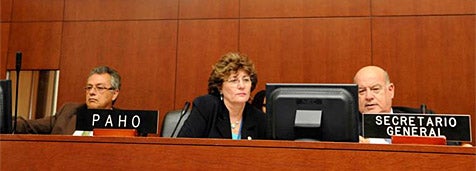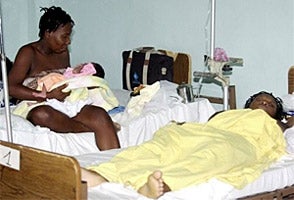Washington, D.C., 18 September 2009 (PAHO)—The Director of the Pan American Health Organization (PAHO), Dr. Mirta Roses, pointed out the success of health programs in Haiti this week, during the presentation of a report on the Inter-American Mission to Haiti in the Permanent Council of the Organization of American States (OAS). The report was submitted by Assistant Secretary General of the OAS, Ambassador Albert Ramdin, who headed the high-level mission to Haiti.

From the left: Ricardo Mario Domínguez, (OAS), PAHO Director Mirta Roses Periago, and José Miguel Insulza, OAS' Secretary General. (Photo by Juan Manuel Herrera - OAS)
Dr. Roses said the mission enabled PAHO to show the role of health in the development in Haiti, describing the Free Obstetric Care program (SOG), which began as a pilot study for a sustainable social protection system in Haiti. The program offers free access to health services for low-income pregnant women, thus helping to increase the number of births with medical care by removing the financial barriers to people without resources in Haiti. There has been a 59% increase in deliveries with medical care in participating health centers and maternity facilities, and a survey of beneficiaries yielded an 83% satisfaction rate, she noted.
"The success of the SOG can be seen in the nearly six-fold reduction in maternal mortality among women who currently use the free service, which has been implemented in 60 institutions throughout the country," added Dr. Roses. The project seeks to strengthen the governance of Haiti's Ministry of Public Health and Population, create a social protection fund, and incorporate it in State policy to ensure the sustainability of free basic social services, beginning with prenatal and delivery care.

A woman holds her baby at Port-au-Prince's Isaie Jeanty hospital where women can give birth for free. (Photo AFP)
Dr. Roses called for a greater commitment to coordinating international cooperation, negotiation, and consensus-building among donors to build the Haitian State. She noted the importance of dialogue among civil society, the private sector, and inter-American agencies in fostering complementarity rather than competition among them to achieve economic growth and the democratic and institutional strengthening of Haiti.
She also pointed to the success of the five field visits that were made to view the concrete results of the projects and programs executed in Haiti by the inter-American agencies:
- The Free Obstetric Care program (SOG), a PAHO project in Port-au-Prince;
- The modernization of Haiti's civil registry, an OAS project;
- The Basic Capital Infrastructure Rehabilitation Program, a project of the Inter-American Development Bank in Jacmel;
- The Pro-Huerta project in Gonaïves, an IICA project; and
- The Community Development Project in Cité Soleil of the PADF.
Ambassador Ramdin indicated in his report that the mission's main objectives were to maintain the dialogue with Haitian authorities to continue providing support for the government in accordance with the needs and priorities set by Haitian President René Préval. The mission aimed to publicize successful projects and programs financed and executed by the Inter-American agencies and various Member States that have had a positive impact on the live of Haitians. He also mentioned that a policy is being drafted that will help strengthen Inter-American collaboration and coordination to promote the development of Haiti.
Participating in the three-day mission were President René Préval, the President of the Senate, representatives of the Provisional Electoral Council, private sector and civil society leaders, representatives of the international community, the United Nations Stabilization Mission in Haiti (MINUSTAH), a special delegation from the United Nations Secretary General to Haiti, representatives of nine Member States, and a group of journalists.
For more information please contact Daniel Epstein, Information Officer, Knowledge Management and Communication, tel (202) 974-3459, fax (202) 974-3143.



